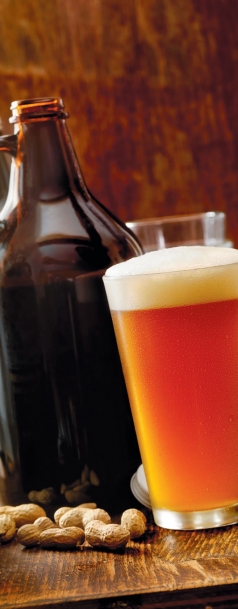Attitude Adjustment
Growing the State’s Culinary Tourism Industry, One Drink at a Time
The time has finally come for craft beer enthusiasts to raise their pint glasses in celebration. Legislation that Governor Gina Raimondo signed into law in September allows Rhode Island’s craft distilleries and breweries “to sell cited quantities of beverages to visitors attending a tour or a tasting to purchase and take home.” Senator V. Susan Sosnowksi and Representative Michael A. Morin were chief sponsors of the bills, 2016-S 3053A and 2016-H 8100B, respectively.
Before the law was signed, only limited samples, provided in conjunction with a brewery or distillery tour or a tasting, were permitted for off-premises consumption: 72 ounces of beer in cans, bottles or growlers, equivalent to six (12-ounce) beers; and 375 milliliters of distilled spirits (called a pint, though it is more like ⅘ of a pint), which had to be marked clearly as samples. The rules were vague about what was available for on-premises consumption.
Before opening Tilted Barn Brewery in Exeter, Matt Richardson (who owns the brewery with his wife, Kara) envisioned legislation to establish a farm brewery license to parallel the farm winery license, which allows wineries enormous flexibility around wine sales and tastings, including the freedom to sell their products without such restrictions. When that effort failed, Richardson teamed up with other local breweries to see what changes might be possible.
“Rhode Island was so outdated in terms of how [licensing] works in other states; we were being handcuffed,” said Richardson. That inspired Macky McCleary, then the director of the Rhode Island Department of Business Regulation (DBR), to get involved. Disappointed with DBR’s failure over many decades to play a leadership role on this issue, he knew change must benefit all parties—distributors; brewers and beer; wine and spirit retailers, who “have unaligned interests under the three-tiered system [which has existed since Prohibition].” In September 2015, he began meeting with local brewers and distributors. While the distributors recognized they’d make more money under the proposed changes, retailers were “the hardest group to bring in … changes are threatening to them,” he said.
At least one person—presumably a retailer—felt threatened enough to send out an anonymous letter to local breweries in late March 2016. Posted on Proclamation Ale Company’s blog, it stated, in part, “If you enter the retail market and compete, you can’t expect the retailers to support brewer’s products. Guaranteed, you will find the brewer’s products will no longer be welcome on their shelves … “
After Proclamation Ale in West Kingston posted the letter and its pointedly acerbic response on its blog, the threat backfired. Then, said Dave Witham, who owns Proclamation Ale with Joshua Karten, “Everybody got behind the breweries; other retailers said, ‘We support the breweries … ‘“
“We’ve tripled our revenue since [the General Assembly passed the legislation],” said Witham. With that increased business, they hired one full-time and two part-time employees—to add to Proclamation Ale’s crew of Witham, Karten and two full-time employees.
With increased business, Richardson could afford to leave a full-time job outside the brewery to work exclusively on Tilted Barn Brewery. “[Breweries] have been hiring people right and left; [there’s] more sales and more demand,” said Richardson, who acknowledged the strong demand for Tilted Barn Brewery’s beers, even before the bills passed. “People who are into craft beer like to travel and visit breweries … but it’s only worth it if you can come home with a decent amount of beer.” Richardson, whose brewery is now welcoming more out-of-towners and regular customers who can purchase more beer, lauded McCleary’s persuasive behind-the-scenes work with the legislation’s proponents and opponents.
Now any visitor can make one visit per day to any licensed local brewery to taste (on premises) up to 36 ounces—equivalent to three (12-ounce) drinks—and purchase up to 288 ounces of malt beverages (equivalent to one case of beer) produced onsite for off-premises imbibing. At the licensed local distilleries, each person can taste 4.5 ounces (three shots) of distilled spirits per day, and purchase up to 750 milliliters (a fifth) of distilled spirits produced onsite for off-premises consumption.
Given Rhode Island’s focus on food and food tourism, our liquor industry should be as vigorous as that in Massachusetts and Connecticut, said McCleary, who called Rhode Island’s breweries the “darlings of the industry.” Pleased that the law is benefiting employment, he said, “It’s not just the breweries but distributors and the Teamsters, too—even retailers are moving more product. It’s a wonderful situation of a rising tide lifting all boats.”





